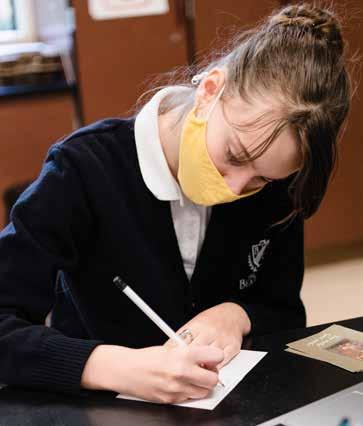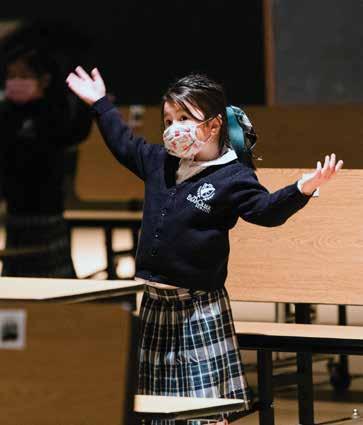
7 minute read
Building Resiliency in Children and Tweens
BUILDING RESILIENCY
IN CHILDREN AND TWEENS
ONE OF THE PRIMARY GOALS OF A CHRISTIAN CLASSICAL EDUCATION IS TO INSTILL VIRTUE IN STUDENTS, TEACHING THEM TO SEEK WISDOM, NOT MERELY
FILL THEM WITH INFORMATION. This is a lifelong pursuit and can often be an arduous path. At Bear Creek, we approach education incarnationally— that is, encompassing the whole child—body, mind, and spirit. Supporting students’ social-emotional wellness is an important facet of what we do.
Bear Creek hired Emily Besaw MSW, MDiv, as a Student Support Specialist in August 2021 to help support our teachers and students in grades K – 8 with their social and emotional learning and mental health needs. Modus Vivendi sat down for an interview with Emily about how she approaches her work with our students.
MV: HOW DID YOUR JOURNEY BRING YOU TO BEAR CREEK?
EB: I have always wanted to be a therapist and felt called to the profession from a pretty young age. I received a master’s in divinity degree from Princeton Theological Seminary along with a master’s in social work from Rutgers University. After graduation, I began working at a men’s trauma program in the Philadelphia area, then later specialized in working with youth with eating disorders. My husband and I moved to Seattle from Philadelphia in the middle of the pandemic, which was rather disorienting! He was hired as a Middle School teacher for Bear Creek in August 2020, and then a year later, when this position was created, I spoke with Middle School Dean of Students Nathan Pettit and discovered that we shared common goals about how to support students, so I applied. Thus far, my role has been helping teachers navigate conversations with students who are emotionally struggling. I love engaging students about the “big questions” of life because this incorporates my passions of faith formation and human development. There is nothing more exciting for me than helping students connect their physicalemotional experiences with their spiritual experiences. While I’m still learning more about my role at Bear Creek, I am excited to be here!
MV: WHAT IS UNIQUE ABOUT SOCIALEMOTIONAL DEVELOPMENT FOR YOUNGER STUDENTS?
EB: One of my favorite child psychologists, Erik Erikson, laid out a theory related to the psychological challenges of school age and adolescent children wherein children develop a sense of competency and continuity within their senses of self. Erikson believed each child is continually faced with developmental crises (they’re crises because they involve a child’s psychological need). In theory, successful completion of each developmental challenge results in a healthy personality and the acquisition of basic virtues. His theory is rooted in a child’s social context, which
PHOTO BY JANEEN SORENSEN

Grade 7 student writes a note of encouragement during a mini service project
he believed would contribute to how the child goes about “developing resiliency,” thus building a more complex view of the world and developing mutually helpful relationships with others.
Two of Erikson’s stages stand out regarding K – 8 students:
Industry vs. Inferiority: In this stage, typically ages 5 through 12, a child’s teacher becomes more significant in his/her life as children learn to read, write, and build other specific skills. A child’s peers also become more important and play a major role in contributing to their self esteem. If children are encouraged and reinforced for their initiative, they begin to feel competent and confident in their abilities. On the other hand, if initiative is not encouraged, then the child might begin to feel inferior, doubting his or her own abilities. Some failure is necessary to learn, and a good teacher will help students find that balance between taking initiative and making mistakes. Identity vs. Role Confusion: Adolescents are searching for a sense of self and personal identity (cue the stereotypical dyed hair color, punk music, and deviation from parents!). Adolescents are becoming independent, yet desire to fit into their social context. This stage poses opportunities for teens to “try on” various roles, allowing them time to explore their beliefs, goals, and values. Adolescents tend to re-examine their identities until they sense they have grown into the changes (i.e., changes in their body, expectations amongst peers, etc.). Eventually, this leads to the adolescent developing a sense of fidelity, or rather, remaining true to oneself. Lack of completing this developmental crisis, in theory, results in confusion, insecurity, and unsureness about one’s sense of self, one’s future, and where one would fit in.
MV: HOW DOES A CHRISTIAN CLASSICAL EDUCATION HELP SUPPORT STUDENTS THROUGH THESE DEVELOPMENTAL STAGES?
EB: During the stage of Identity vs. Role Confusion, students are constantly “testing” their world, “trying things on,” and seeing “how they fit.” This is where a Christian classical education is essential. During this fundamental stage, Christian education doesn’t just provide another option amidst a myriad of options, it helps students learn how to look for the things that will most fulfill their deepest desires. As James K. A. Smith, a philosopher, author, and professor at Calvin University points out, “we are what we love.” Smith here is echoing the words of St. Augustine who succinctly stated, “Our hearts are restless, until they rest in [God].” In our recent professional development training, James K. A. Smith spoke to this matter and reminded Bear Creek’s faculty and staff of a crucial truth about how and why students believe in God. He said, “The plausibility of belief is often pegged to a person.” In other words, when a student is in this stage of “Identity vs. Role Confusion,” it is more often relationship with Christians that is most compelling in determining whether someone believes in the gospel.
This is also why Virtue Awards are given in grades K – 4. We are not just handing out certificates, we are training students to look for virtue both in themselves and others. Virtues such as perseverance, kindness, patience, diligence, and love are publicly recognized and celebrated regularly in Chapel, with specific students noted as exemplars of each virtue for the week. In grades 5 – 8, the curriculum incorporates skill-building around these social-emotional areas. This stage moves from recognition of virtue to the gradual habituation of virtue. As students begin to experience and learn virtue, they are more likely to desire virtuous role models. This is where the Christian teacher serves as the person to whom the “plausibility of belief is pegged.”

MV: HOW DO YOU THINK THE PANDEMIC HAS AFFECTED THE MENTAL HEALTH AND SOCIAL-EMOTIONAL WELLNESS OF CHILDREN?
EB: An intentional focus on social-emotional learning has always been important, but it seems imperative now. Kids thrive on structure, and there has been so much unpredictability in the past two years. Many children also missed out on a year of “normal” socializing, and that means we need to work harder to re-orient them towards others and healthy relationship building. We see an increased need to help our students identify their feelings and connect them with their behaviors and how their actions affect other people.
I see this happening every day with the younger students when their teachers encourage them to dance together during a classroom “brain break” or play cooperative games during recess. These activities also build their sense of confidence. All these shared experiences help build healthy relationships.
For older students in grades 5 – 8, students are dealing with external social and academic pressures, as well as significant internal changes caused by puberty. The combination of external and internal
PHOTO BY JANEEN SORENSEN
Kindergarten student worships during Lower School Chapel
challenges often produces anxiety and other “big” emotions. Some of our students are experiencing doubts about their faith and asking big questions about God and their own role in the world. It is important for us to provide space for students to ask those questions and help guide them as they process their feelings and begin to develop their identities. Middle School Advisory classes also focus on how students treat one another with dignity and respect and encourage mutual support for one another and service to others.
The intentional social-emotional learning support, curricular strands, and modeling of Christian virtue unite in a Christian classical school environment to provide a strong scaffolding for children to build their sense of self and ground themselves in Christ as they grow to become the individuals God intends.







